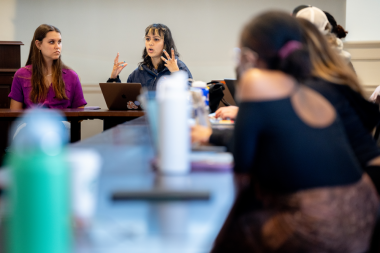Collections
Expertly curated content on a wide range of pedagogically focused topics

Qualitative Analysis in SoTL
This collection provides an overview of qualitative analysis, guidance for selecting and conducting qualitative analysis, including thematic analysis and constant comparative analysis, and the role of validity and reliability in qualitative research.

SoTL Data Management and Documentation
Effective data management is essential to your SoTL project’s organization, reproducibility, and meaningful dissemination of findings. This collection provides guidance and practical tools for organizing your data, creating documentation, and avoiding common pitfalls.

Quantitative Analysis in SoTL
Analyzing SoTL data requires the appropriate methods. This collection provides guidance for quantitative analysis, including tools for selecting statistical tests, step-by-step instructions for conducting analyses, and examples from common SoTL study designs.

Teaching with Custom AI Chatbots
The default behaviors of popular AI chatbots don't always align with our teaching goals. This collection explores approaches to designing AI chatbots for particular pedagogical purposes.

Dialogue & Deliberation Across Differences
The ability to have productive and respectful discourse with folks holding different values, identities, and opinions is critical for a functioning democracy, but challenging to foster. This collection supports instructors preparing students to engage across differences.

Creating a Classroom Environment in Which Civil Discourse Can Thrive
Are fostering civil discourse and dialogue across difference teaching goals for you? Don't wait until potentially controversial topics emerge and hope for the best. Start cultivating community on day 1 by using some of the activities described in this collection.

Assessing Student-AI Collaboration: Innovative Grading & Rubric Strategies
Generative AI has brought new urgency to longstanding assessment challenges. How do we grade individual contributors within a collaboration? What belongs to the human, and what to the technology? This collection offers new approaches to assessing human-AI collaboration in educational settings.

Supporting Faculty through AI Transition: Tools for Educational Leaders
Faculty are adapting to AI in complex ways beyond simple adoption or resistance. This collection provides educational leaders with frameworks to understand faculty decision-making, identify change barriers, and facilitate inclusive AI integration conversations.

Designing a SoTL Study
Designing a SoTL study requires thoughtful decisions about study design, methods, and disciplinary approaches to inquiry. This collection introduces a range of accessible resources to help you choose a study design that aligns with your research questions and scholarly goals.

How Can You Help Your Students Use Generative AI Tools Responsibly and Ethically?
How can you help develop students’ AI literacy, even when you’re not an expert in AI? In this collection, you'll find articles and activities that articulate and develop key AI competencies for educators and your students.

Designing Assignments for Academic Integrity in the AI Age
Generative artificial intelligence has made longstanding questions about academic integrity more urgent and complex. How does genAI change our understanding of plagiarism? What can or should instructors do to motivate students to complete graded assignments without unauthorized assistance?

Using AI to Support Students with Disabilities
Research shows that text-to-speech (TTS) is a prominent use of generative AI by students with disabilities. This collection features ideas for using AI to support students with disabilities in a variety of educational contexts and points to two AI-powered TTS tools.

Conducting SoTL Literature Reviews
Conducting a literature review is essential to any SoTL project, but it can be challenging to know where to begin. This collection offers practical tools and strategies to help you search for, organize, and engage with SoTL literature—whether you're using traditional methods, AI tools, or both.

Collaborative Writing in SoTL
Whether you're new to SoTL co-authorship or refining your approach, this collection offers resources to help you navigate collaborative writing. You'll find resources on authorship expectations, productive workflows, and models for structuring your work together.

Navigating SoTL Ethics and the IRB
Navigating ethical considerations and institutional review board (IRB) processes is a critical part of SoTL. This collection offers practical guidance and examples on what qualifies as research, how to prepare an IRB application, and how to uphold ethical standards in classroom-based research.

Gathering SoTL Evidence
Gathering evidence in SoTL requires careful choices about what kinds of student learning to make visible. This collection offers practical resources—from survey design tips to a compendium of validated scales—to help you plan for and collect the right data to answer your SoTL research questions.

What is SoTL?
The Scholarship of Teaching and Learning (SoTL) is the systematic study of teaching and learning made public, such as through publication in an education research journal or at a conference. This collection will introduce you to this type of classroom-based research.

Sharing SoTL Findings
These resources support faculty interested in writing and publishing SoTL, from getting started to preparing a manuscript for submission. They offer practical guidance, examples, and insights into developing a strong SoTL story, finding publication venues, and structuring articles.

Developing SoTL Research Questions
Developing a strong research question is a critical first step in conducting a Scholarship of Teaching and Learning (SoTL) project. This collection offers guiding frameworks and practical strategies to help you move from a general topic of interest to a well-defined SoTL inquiry.

Making Teaching Matter: Student Perspectives on Cultivating Character in Higher Education
The Making Teaching Matter for Civic and Intellectual Life project started in 2024 at UVA's School of Education and Human Development. This collection features essays from students involved in the project with advice for instructors on cultivating civic engagement, ethical decision-making, and more.














